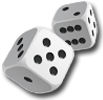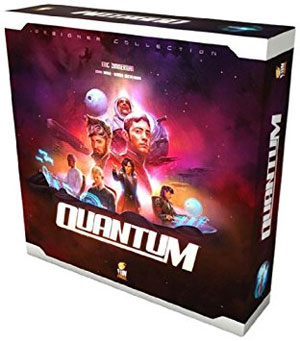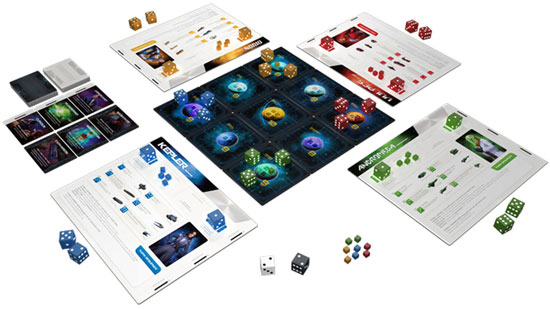



play board games
Board game reviews, strategy tips & session reports
Quantum Board Game Review
 Stats:
Stats:
No. of players: 2-4
Amount of time to play: 45-60 min
Age requirements: 13+
Set-up time: 5 min
Quantum is a sci-fi themed abstract board game for up to four players. This area control game has a good mix of strategy and luck.
Quantum Rules Description:
To win Quantum you need to place all of your quantum cubes on the board. The board is made up of tiles numbered from 7 to 10 with planets on them. There are also spaces for one to four quantum cubes. In order to place a quantum cube
The game also uses six-sided dice. A couple of these dice are used to track your dominance and research. But most represent your spaceships. A ship can move as far as the value it shows and in combat you want lower values. This means a six is a fast but fragile scout and a one is a slow and lethal battlestation.
On your turn you may take three actions. The actions available include; reconfigure, deploy, move/attack, construct cube and research. The reconfigure action lets you re-roll one of your spaceship die. When a ship is destroyed in battle you can deploy it to a planet you have a cube on. A ship cannot move through another ship. If a ship moves into the same space as another ship, combat occurs. A ship may only move once per turn. Constructing a cube takes two of your three actions. And you can up your research die by one for each action you use on research. If it reaches six you can take an advance card.
Combat is resolved by rolling a six-sided die and adding the rolled value to the value of your ship. The player with the lower value wins. If the defender wins they simply repel the attack. If the attacker wins the enemy ship is destroyed. The attacker also gains one dominance and the defender loses one dominance. If you have six dominance you may place a cube on the board. The attacker wins ties. Destroyed ships are re-rolled and placed in their owner’s scrapyard.

Each ship has a unique special ability it can use once per turn for free. The previously mentioned battlestation (1) can attack up to one space away. A flagship (2) can carry a friendly adjacent ship with it. The destroyer (3) can swap positions with another friendly die. The versatile frigate (4) can turn into a destroyer or interceptor. The interceptor (5) can move diagonally. And scouts (6) can reconfigure for free.
You gain advance cards at the end of your turn for placing a cube or getting six research. Advance cards come in two varieties. One type is used immediately and the other stays in play the rest of the game. These cards grant you some big advantages. Some let you gain additional ships or turns, let you re-roll combat die, or use your ships’ special abilities a second time on your turn.
The first player to place their final cube wins the game.
Quick Review of Quantum:
Quantum is a fun area control board game that is accessible and quick to play. It has a good mix of luck and strategy.
The components for this game are great. The board is modular and looks cool. The dice look great and really catch people’s eye. And the all the artwork looks nice too. The rules are easy to follow and read.
Quantum is very straightforward and easy to teach. The box says 13+ but I played this with my 10 year old and his friend. They had no trouble with the rules or understanding the game at all. This game is very accessible and even non-gamers would enjoy it.
I like how the dice are used in this game and how their value relates to combat and movement. That mechanic is super elegant and unique.
The modular board helps add to this game’s replay value. The rules have different map configurations based on the number of players or you can make up our own. The map structure can help make up for the typical weird three player interactions in these types of games. Smaller maps mean more confrontation which I think is a plus.
The advance cards can be pretty powerful and random. It is fun to see what combinations you can make. But be aware some can end the game very quickly (especially Momentum, which gives you an additional turn). I played a couple games where we only got cards through research and that seemed to even things out a bit, but the games took longer too.
If you don’t mind some randomness in your board games, pick up Quantum. It is fun, has replay value, and you can easily teach it to new players.
Score and synopsis: (Click here for an explanation of these review categories.)
Strategy 4 out of 6
Luck 4 out of 6
Player Interaction 5 out of 6
Replay Value 5 out of 6
Complexity 3 out of 6
Fun 5 out of 6
Overall 5 out of 6

Leave a Reply